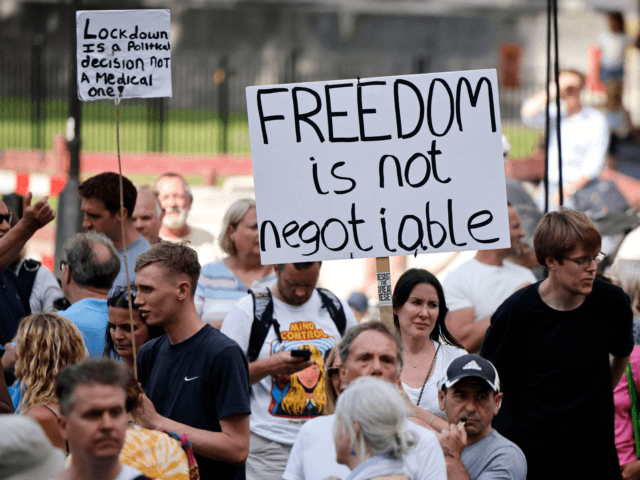Members of the House of Commons, including a Deputy Speaker, were seen laughing as they extended emergency coronavirus powers for the government without an official vote.
The Coronavirus Act, which was pushed through Parliament last year, has been extended for another six months, after previously being renewed in March.
While the previous vote saw a split of 484 to 76 in favour of extending the legislation, Deputy Speaker Rosie Winterton decided to pass the renewal with merely an informal vocal vote of comparing the relative volumes of “ayes” and “noes” in the near-abandoned chamber.
Grinning and laughing, the Deputy Speaker said: “I am afraid I fear the mood of the House is not to have a vote. The right honourable Gentleman would have to rustle up a few more people to really get the sense that we required a vote…”
At which point prominent lockdown sceptic, Tory MP Sir Desmond Swayne shouted out: “The just shall live by faith.”
“I am sure they will… The Ayes have it,” Winterton replied, ushering in another extension to the emergency legislation.
The bizarre scene was criticised by Reform UK leader Richard Tice who said that it demonstrated a “disgraceful prevention of democracy by our own House of Commons.”
Tice, who said that he has “rarely been so shocked”, added that “All MPs should hang their head in shame. You have extended emergency authoritarian powers without even a vote, powers that are totally unnecessary.”
The Labour Party, which has largely been supportive of the government’s harsh lockdown tactics during the Chinese coronavirus pandemic, again failed to act as an opposition to Boris Johnson’s government, supporting the extension as it included increased provisions for sick pay.
“This public health crisis is not over, Covid has not gone away. We can learn to live with the virus but that is not the same as pretending it no longer exists,” said Labour’s shadow health secretary Jonathan Ashworth.
Amid pressure from within his own party, Johnson’s government did remove some of the more draconian measures within the legislation, including powers to prevent or restrict public gatherings or events, as well as the ability for police to detain potentially infectious citizens.
One of the Conservative MPs who opposed the measure, Steve Baker said in the Commons that when the Act was initially “rammed through Parliament” last year, he warned of an increasingly dystopian society.
“I had no idea then just how dystopian it would be,” he lamented.
While the Coronavirus Act has drawn most of the attention of lockdown opponents, much of the government restrictions imposed on British society have been done through existing public health legislation, namely the Public Health Act 1984.
The 1984 legislation has been used by the government to introduce lockdowns, restrictions on gatherings, mask mandates, and the forceful closure of businesses.
Former Supreme Court judge Lord Jonathan Sumption and Steve Baker MP have called for updating public health laws in order to prevent future governments from imposing such restrictions, again.
The proposed reforms include requiring the government to publish impact assessments on health, economy, society, and education in order to gain emergency powers. They also argued that emergency powers should be confined to a 30-day period, at which point the government would have to justify its actions to date and explain the reasoning for the need for an extension.
Follow Kurt Zindulka on Twitter here @KurtZindulka

COMMENTS
Please let us know if you're having issues with commenting.